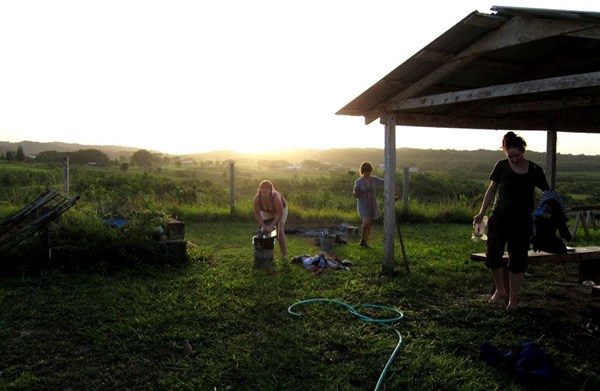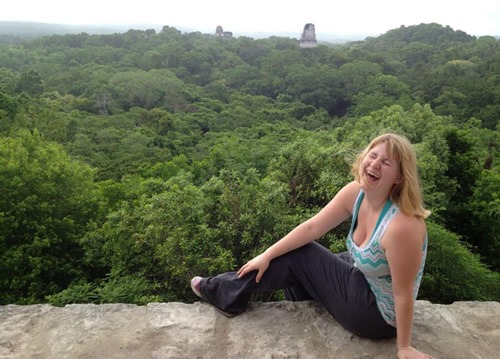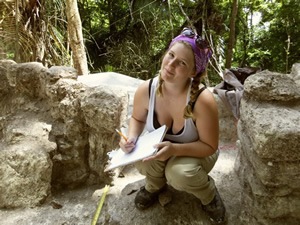How to Pick an Archaeological Field School Abroad
Article and photos by Kobi Weaver
Picking a field school can be an overwhelming experience for anyone, especially for an undergraduate new to archaeology or travel. Here is a guide with simple tips, recommendations, and tools to ensure that your first field school experience makes for the summer of a lifetime.
 |
| The author is at work with classmates at her archeological field school. |
Choose Your Area of Study
Your area of study is the most critical decision you can make in determining what field school to attend, as it can determine the rest of your undergraduate academic life. For many people, this will be an easy decision. Ask yourself: "What does my department focus on?" For example, while studying at New Mexico State University, my department focused on Southwest Archaeology. Like many educational institutions, they even had a field school led by professors during the summer. Summer school is an option that most students at my university choose, as it requires no travel, and you can stay in your apartment or keep a job during the summer.
Although it might be more accessible, this might not be the appropriate option for you, just as it was not for me. Instead of studying Southwest archaeology, I was drawn towards Maya archaeology. While we had one professor of Maya archaeology at my university, we had no field school. So, I found myself on my own in finding a school.
 |
| The author enjoys overlooking the forest and ancient ruins during her studies. |
How to Compare Programs
When comparing programs, you should consider three main criteria: Cost, University Credit, and Reputation.
1) Cost
In my case, and that of other broke college students, this was the most critical factor. The cost can vary widely, from $2,000 monthly to $10,000 for two weeks. Be sure to check what the program fees include.
Take this excerpt from an ad for a field school in the Mediterranean, for example:
INCLUDED SERVICES:
• Accommodation
• Transfers to and from the places of work
• Certificate of participation
• Insurance
SERVICES NOT INCLUDED:
• Food
• Any extra activities not specified under "services included"
The biggest downside in the program description above is that food is not included. When you are out in the field working all day, nourishment becomes a singular obsession. Given the vagueness of the program description, much does not fall under "services included," which could cause concern regarding your actual participation cost. Look for a program that offers more details. It would be best if you were comfortable with the basic package.
The following is an excerpt of the description from an ad for the field school I decided to attend: the Maya Research Program.
“Participants stay in residential cabanas (maximum of 2 per cabana). All meals are hearty and provided within the overall cost. All field equipment and supplies are also provided.”
I became more comfortable choosing the program because it described how my fundamental needs would be met when I arrived on site.
In every case, you should receive answers from the organization and from your own research necessary to factor in the associated additional costs. Costs can include those related to the field school, including travel to and from the program, optional other excursions and tours, the cost of tuition if you choose to receive college credit, food, drinks, visa fees, and equipment.
2) University Credit
Suppose you are going to a program through your university. In that case, you will likely receive credit for the field school experience, but always enquire. If you choose to go through a different program, the situation can get more tricky. First, make sure you choose an accredited program that offers academic credit. The program listing will tell you if university credit is available. Many programs are run through different universities than the one you attend, and you can gain and transfer credit from their institution. Alternatively, your study abroad department can set up a course of study such that you can receive direct credit or take a program as part of an Independent Study curriculum. I recommend meeting with your study abroad advisor and working with them directly to figure out the course of study that will work best for you after discussing your interests with your department advisor.
3) Reputation
Field schools can be challenging. You are out of your comfort zone, doing hours of physical labor daily with the same group of people for weeks to months. While most archaeologists find field schools an incredible and life-changing experience that evolves into a lifelong passion, the commitment required should not be underestimated. For this reason, you want to ensure you attend a reputable and quality program. There are horror stories of programs where too many students were crammed into tents in the rain, given too little food, and provided unsanitary bathrooms. Dysentery is not something you want to get at all, and it's even worse getting it at the same time as your friends in a jungle without private bathrooms…especially when it could all have been avoided. So, do your research.
The easiest thing you can do is search for the program online. Does the program have any reviews, a good website, or a Facebook page? Email. Ask the organization for more details regarding what is included, what to expect, and whether they can put you in direct contact with former students to ask them questions.
Another underutilized resource is asking your archaeology professors about the field school. Networking is essential in academia, so your professors likely know their colleagues working in the same region or have heard stories at the very least. They can give you recommendations or tell you where and what to avoid.
Ask friends, upper-level students, or graduate students where they went! By so doing, you can receive a first-hand account of their experiences and know more precisely what you're getting. And don't be shy to ask strangers — trust me, archaeologists love to talk about field schools.
Tools
The tool that helped me most while assessing my options was the interactive map of field schools at the database website offered by the Archaeological Fieldwork Opportunities Bulletin. The web interface takes the form of an interactive map of the world, with pins showing the locations of field schools on every continent except Antarctica. You can narrow your search by country and view a list of matching field schools. Then, you can select from any matches to read all the detailed information in what they call a "profile."
The archeological field program profile contains as much information as the school itself provides. For example, The Maya Research Program, which will run for some time and is my field school, has one of the most detailed profiles on the site. It includes everything from the cost of lodging to scholarship information, whether you will receive academic credit and a link to the actual website.
Commit
Finally, it would help if you committed to an archeological field school. Spots can fill up early, and you want to make sure you have one of them! I cannot stress enough my incredible experience in field school. The field school provided me an edge academically. It gave me archaeological skills and experiences my classmates needed to improve.
Nevertheless, it opened up my worldview, served as a great starting point for solo travel, helped me to improve my Spanish language skills, developed a sense of self-reliance, and taught me how to make friends and work as a team member and leader. After my first year, I went back again and even conducted research to write my undergraduate thesis. And it was fun. I made friends with whom I'm still close and learned how to do it. It was fun. I made friends with whom I’m still near, knew how strong I could be inside and out, swam in a beautiful cenote, hiked through a jungle daily, climbed ancient ruins, and excavated Maya burials. Choosing a field school can be a little overwhelming, but don't let that stop you. It will be worth it in the end.
 |
Kobi Weaver is an archaeologist and educator currently living in Louisiana. She writes a blog and hopes to strike a balance between travel, family, and graduate school. |
|
